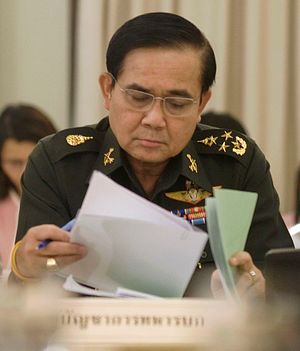Thailand’s ruling junta got what it wanted on August 7: the public approval of a constitution that will reinforce military rule in the country. The same constitution also contains provisions that could further curtail the people’s right to freedom of expression.
Some are questioning the result of the referendum because the opposition was prevented by the government from campaigning against the draft constitution. The junta has passed an absurd law criminalizing any activity that could persuade the people to vote in favor or against the constitution. This law was invoked in detaining more than 100 individuals accused of spreading lies and undermining the stability of the country.
Will the new constitution ease the media restrictions? Will it lead to the restoration of democratic election?
The junta has made an assurance that elections will be held next year or early in 2018. But what it doesn’t emphasize is that military officials will be appointed in the parliament. It is also silent about the constitutional provisions that will perpetuate state control over the media sector.
The Southeast Asian Press Alliance (SEAPA) has warned that the constitution “provides the state with potentially more power to intervene on press freedom and freedom of expression.” It added that the new constitution is a “regression” compared to the 2007 constitution with regard to upholding media freedom.
SEAPA has identified sections 34, 35, 36, 41, and 60 as among the provisions that undermine free speech.
Section 34 guarantees academic freedom but it also states that this right “shall not be contrary to the duties of Thai people or good morals of people and shall respect and not impede differing opinions of other persons.” For SEAPA, the phrase “not impede differing opinions of other persons” undermines argumentation, which it asserts is a foundation of academic study.
Section 35 refers to media freedom and retains most of the provisions of the 2007 constitution. However, some important provisions were deleted, such as the part recognizing the right of media personnel to organize their ranks, self-regulation, and promotion of professional ethics. The constitution also removed the guarantee of editorial independence for state media journalists. In the 2007 constitution, intervention by state officials or media owners was called “misuse of power.” This too was removed in the new constitution.
But SEAPA lauded the insertion of a provision requiring state media agencies to report advertising and public relations expenses, since this will strengthen accountability and transparency.
Section 36 reiterates the government policy against censorship. It states that “censorship, detention, or disclosure of communication between persons including any other act, with a view to being aware of or obtaining information therein, shall not be permitted, except by a court order or warrant or any other ground as specified by law.”
SEAPA noted that in the previous constitution, the exception is granted specifically for “security of state, maintaining public order, and good morals.” By removing this in the new constitution, the state can now cite various reasons to justify censorship.
Related to this is section 41, which recognizes the right of the public to access information. Again, the new constitution removed any reference to security of state as the primary reason for a government agency to reject a public request for information. This means agencies can concoct various reasons to prevent the release of vital information to the public.
Section 60 refers to distribution of television and radio frequencies. Broadcasting companies are ordered to advance not just public interest but also the security of the state and national interest. Will the government use this provision to censor a a critical TV or radio program that harms the security of the state and national interest?
In the 2007 constitution, an independent body is authorized to supervise the distribution of frequencies. But in the new constitution, the same body is also “entrusted with the duty to govern the operation pertaining to transmission frequencies in a manner specified (in the previous paragraph).”
A day after the approval of the constitution, the European Union and the U.S. State Department urged Thailand to lift restrictions on civil liberties, especially concerning freedom of expression, to jumpstart the country’s democratic transition. But even if Thailand renews its pledge to honor media freedom, its new constitution institutionalizes a culture of censorship and state control over the media sector.

































